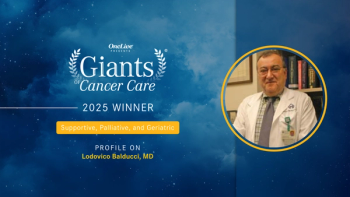
INTORSECT Trial: Second-Line Temsirolimus Versus Sorafenib
For High-Definition, Click
The phase III INTORSECT trial compared the efficacy of temsirolimus to sorafenib following first-line sunitinib as a treatment for patients with renal cell carcinoma (RCC), explains Thomas E. Hutson, DO, PharmD. The trial enrolled 512 patients with a performance status of 0 or 1 and either clear cell or non-clear cell histology.
In the trial, patients were randomized to receive sorafenib at 400 mg twice daily or intravenous temsirolimus at 25 mg/weekly. In total, 80% of patients had clear cell histology with approximately 89% having undergone nephrectomy, describes Hutson. The primary endpoint of progression-free survival (PFS) was prolonged by 4.28 months with temsirolimus compared to 3.91 months for sorafenib; however, this advantage was not statistically significant (P = .1933).
Intriguingly, a statistically significant advantage for the VEGF inhibitor sorafenib was observed in the secondary endpoint of overall survival (OS), notes Hutson. The median OS with temsirolimus was 12.27 months compared to 16.64 months with sorafenib (P = .0144). Unfortunately, Hutson adds, third-line treatment data were not collected for the majority of patients in this trial.
In terms of sequencing, most of the available evidence seems to indicate that back-to-back VEGF inhibition is the most effective approach, remarks Brian I. Rini, MD. However, Rini believes, there is likely an unidentified population that benefits from mTOR inhibition in the second-line setting.
In general, clear cell RCC is predominantly angiogenesis driven through a mutation in the von Hippel-Lindau gene or by hypermethylation, suggests Robert A. Figlin, MD. Additionally, evidence shows a high-level of clinical benefit for the continued blockade of the angiogenesis pathway.
The findings of the INTORSECT trial have broad implications for cancer research, moderator Daniel J. George, MD believes. For investigators, it is important that findings in PFS line-up with those made in OS. If they do not, it raises the question of whether there is something happening that is not being measured. Additionally, it is important to align clinical trial endpoints with what the patient actually desires, Figlin state. In terms of outcomes, patients inquire about the affects of treatment on their quality and quantity of life, not PFS.



































